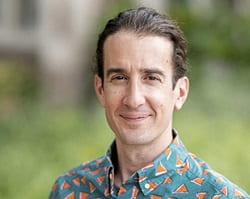Sleep is a fundamental need, just like food or water. “You’ll die without it,” said Keith Hengen, PhD, an assistant professor of biology at Washington University in St. Louis. But what does sleep actually accomplish? For years, the best researchers could say is that sleep reduces sleepiness — hardly a satisfying explanation for a basic requirement of life.

But by melding concepts from the fields of physics and biology, Hengen and a team of Arts & Sciences researchers have constructed a theory that could explain both the meaning of sleep and the complexity of the brain. As reported in a new study published in Nature Neuroscience, they tracked the brain activity of sleeping rats to make the case that the brain needs to regularly reset its operating system to reach “criticality,” a state that optimizes thinking and processing.
“The brain is like a biological computer,” Hengen said. “Memory and experience during waking change the code bit by bit, slowly pulling the larger system away from an ideal state. The central purpose of sleep is to restore an optimal computational state.”
Co-authors of the paper include Ralf Wessel, PhD, a professor of physics; Yifan Xu, a graduate student in biology studying neuroscience; and Aidan Schneider, a graduate student in the Computational & Systems Biology program, all in Arts & Sciences.
Wessel said physicists have been thinking about criticality for more than 30 years, but they never dreamed the work would have implications for sleep. In the world of physics, criticality describes a complex system that exists at the tipping point between order and chaos. “At one extreme, everything is completely regular. At the other extreme, everything is random,” Wessel said.
Criticality maximizes the encoding and processing of information, making it an attractive candidate for a general principle of neurobiology. In a 2019 study, Hengen and Wessel established that the brain actively works to maintain criticality.